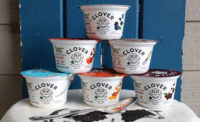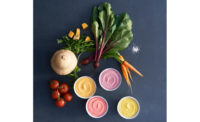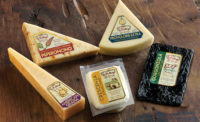Consumers seek organic dairy products
Organic dairy sales are trending up as consumers flock to clean ingredients and look for non-GMO products.


As of Feb. 2017, all organic dairy categories are showing dollar sales up compared to this time last year — except for milk, which is down slightly.

Emmi Roth USA

Stonyfield Organic

Straus Family Creamery

tera’s whey






Growing consumer demand for natural and clean-label products has sparked a movement in the food industry. Specialty and organic retailers are on the rise and mainstream retailers are putting more natural and organic products on the shelf.
Over eight in ten (82%) of U.S. adult consumers buy organic products at least occasionally (based on January-March 2017 usage), according to a report by the Hartman Group, Bellevue, Wash. The growing clean-eating movement has brought increasing cultural focus on an assortment of food categories, notably local and artisan products, said the report.
Perhaps the greatest influence on this continuing trend is that the word “organic” has a range of meanings related to three key ideas: grown naturally first and foremost (particularly without farm-level chemicals), made simply and made responsibly, according to the Hartman Group. Of course, the USDA’s National Organic Program includes a definition and rules for labeling.
Another organization, The NPD Group, Port Washington, N.Y., reports that millennial parents and their children are leading the way in the growing consumption of organic foods.
Organic dairy in demand
Dairy, the second largest U.S. sector in the organic category, saw a swing in the marketplace from the shortages of organic milk recorded in 2014 and 2015 to a surplus of milk in 2016, according to a 2017 report from the Organic Trade Association (OTA). The $6.4 billion organic dairy category did see growth of 6.2%, yet 2016 was a softer year for most producers.
The oversupply left some farmers without a market partner, but it did provide some margin of relief in categories such as ice cream, and the opportunity for new product development in categories such as coffee creamers, butter, yogurt and cheese, said OTA’s report. These latter categories had previously been limited in growth in recent years, with product lines even put on hold due to a lack of surplus organic dairy. Organic whole milk and 2% were in higher demand than 1% and skim milk in 2016, as consumers learn through research and media that healthy fats, such as those found in dairy, are beneficial.
According to Information Resources (IRI), Chicago, retail volume sales of organic fluid milk rose by 1.1% in 2016 versus the previous year.
Organic white milk saw sales of $1.4 billion in the 52 weeks ended Feb. 25, 2017, while organic flavored milk stands at $29 million, according to Nielsen. In the organic yogurt category, dollar sales saw a 17% increase and sales close to $329 million in the same time period.
Organic dairy products
We’ve highlighted a handful of new organic dairy products that have hit the market recently.
PREMIUM ORGANIC CHEESES
Emmi Roth USA, Monroe, Wis., introduced Roth Organics, a new collection of four cheeses made with organic milk. The line features its Grand Cru Original, Van Gogh gouda, Havarti and sharp Cheddar. The Grand Cru is an Alpine-style cheese and cured for a minimum of four months. The cheeses are sold in wheels, loaves, blocks and retail cuts, and are available nationwide.
ORGANIC WHOLE-MILK YOGURT SMOOTHIES
Londonderry, N.H.-based Stonyfield Organic launched whole-milk drinkable smoothies in two flavors, peach and strawberry. The strawberry flavor contains 160 calories, 7 grams of fat, 15 grams of sugar and 6 grams of protein per 6-ounce serving. The non-GMO smoothies are available at select Whole Foods nationwide for a suggested retail price of $4.99 per 4-pack of 6-ounce bottles.
ORGANIC GREEK YOGURT
Straus Family Creamery, Petaluma, Calif., added two organic Greek yogurts to its line. Whole-milk vanilla and low-fat plain are available in 32-ounce containers. Existing Greek yogurts in the line were whole-milk and nonfat plain. The vanilla flavor contains 240 calories, 7 grams of fat, 32 grams of sugar and 32 grams of protein per 1-cup serving. The Greek yogurts are available at California grocery stores at a suggested retail price of $7.99, with a larger distribution in other western states anticipated by mid-year.
ORGANIC WHEY PROTEIN
Madison, Wis.-based tera’s whey makes a specialty organic whey protein powder. The protein is grass-fed, gluten-free, non-GMO and kosher. It’s available in vanilla, chocolate and plain varieties. The chocolate flavor contains 110 calories, 2 grams of fat, 2 grams of sugar and 20 grams of protein per 2-scoop serving. The powder is made with whey protein concentrate, organic cocoa and organic stevia. It is available nationwide at grocery stores, including Whole Foods, Sprouts, Kroger, Costco, Target and H.E.B. The suggested retail price is $32.99 per 12-ounce container.
Looking for a reprint of this article?
From high-res PDFs to custom plaques, order your copy today!












